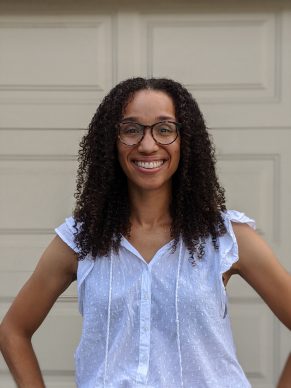Alexandria Scott has a background in nonprofit work, so when she didn’t find the resources she wanted to teach her children about being anti-racist, she created them herself.
Could you please tell us a little about your background, family, and education?
I was born and raised in Baltimore, Maryland as one of five children. I attended BYU Provo and received a BA in Political Science in 2008 after which I served a mission to Taipei, Taiwan. I feel like my work experiences were a big part of my education. During and after college and my mission, I worked for several different nonprofit organizations. I learned so much!

Ditto Kid Magazine
What was the catalyst that led you to create the magazine Ditto Kids?
As the mother of young children, I saw first-hand and early on the importance of teaching my kids not just about diversity and inclusion or tolerance, but about being actively anti-racist. I looked everywhere for resources that could help me get organized and feel prepared to teach my kids on a consistent basis, but I wasn’t able to find anything.
Antiracism is a fairly new term for a lot of people – how do you define it, and what does it mean to you? What separates it from inclusion and diversity?
The primary goal of anti-racism is to dismantle systems of racism and create restorative justice. The root of anti-racism is action. The difference between anti-racism and diversity/inclusion is that anti-racism advocates for systemic change, and diversity & inclusion advocates for education and change without changing or analyzing accepted systems.
Sister Joy D. Jones just spoke in General Conference about proactively teaching our children the gospel of Jesus Christ. What are some specific ways this fits into that charge from Church leaders?
Every baptized member of our church commits to serve the Lord, mourn with those that mourn, and love their neighbor as themselves. This is, of course, about as difficult as it gets and it’s a life-long journey. But we can give our kids a head start by teaching them gospel principles within this context. The Savior’s gospel is an integral part of my life, and truly, a lot of how Ditto Kids is formatted and what it touches on is related to that. We talk about honesty, humility, and being willing to change when we realize we are wrong or have made a mistake and what a wonderful gift that is.
Why was a magazine your choice of medium to share what you want to say? (As opposed to a book or podcast.)
Over the course of a few years, I researched, took classes and workshops, and began to write a curriculum supplement that would help parents and educators guide kids through anti-racism using decolonized history and culture. I decided to put it in magazine form with plenty of images, stories, and activities as a simpler and more engaging way to help kids connect with the magazine. I felt like there were so many resources out there for parents or teachers to educate themselves and then to teach kids, but nothing that was expressly for kids.
Where does the magazine name come from, what is the meaning of “Ditto” Kids?
Every kid wants to be loved, wants to learn, wants to play, wants to feel and know that they’re special. We want kids to learn that when they meet people who they might not think they have much in common with, to remember that actually, “ditto,” they do! We can embrace our similarities, celebrate our differences, and care for and support each other and advocate for each other’s fair treatment.
Has there been any feedback about experiences kids have had after engaging with your material that you could share?
I think some of the most common feedback we’ve received from caregivers and educators is that this is a reference volume. It stays on their shelf and is something they can refer back to time and time again. Because of this and the way it’s formatted, we’ve received feedback that it really helps to set the stage for important conversations to come up naturally.

Alexandria Scott
What does the phrase “all are alike unto God” mean to you?
More than anything, at this point for me, it serves as a reminder that still, people need to be taught this. It seems to be the quintessential struggle of the human experience and we all need help. And that makes me sad for us in some ways as people; but ever grateful for God, for inspiration and that humankinds’ ways and wisdom are not the edge of our understanding.
What are some actions that you have taken as a parent with your own children to practice true Christian fellowshipping?
To care for themselves and be authentic in their relationships and interactions with others. I think being real and vulnerable with yourself and others makes truer connections and that’s how we lift each other up.
Are there any specific scripture references that you personally focus on to support your work?
3 Nephi 14: 7-8: “Ask, and it shall be given unto you; seek, and ye shall find; knock, and it shall be opened unto you. For every one that asketh, receiveth; and he that seeketh, findeth; and to him that knocketh, it shall be opened.”
I love this scripture because it reminds me that I won’t learn what I need and want to know if I don’t humbly ask others and the Lord. In my opinion, examining our own biases is some of the most challenging work that there is and though it’s a lifelong journey, it’s aided by humbly listening and embracing repentance and change as a wonderful and important thing.
Would you be willing to share a time in your own life of examining a bias and changing yourself, and how the Lord helped you through that experience?
I was definitely influenced by unfortunate commonly held beliefs in our faith and the wider faith community regarding LGBT persons and rights. In high school, I had some friends who identified as LGBT. They were just kids like me and what I was being taught didn’t square with what I saw around me. We’ve all been blessed with eyes to see and ears to hear and the Light of Christ. I think the Spirit is always trying to nudge us. Learning to separate impressions from what we’re hearing around us is a lifelong challenge for everyone.
Is there a particular person of color in Church history you look up to as an example of faith?
Darius Gray is a powerful example to me of the ability to make a difference. But I also think of the very many unknown. There are many people in the community who have chosen to take a step back from participating in the church who have a deep and abiding faith in God. I love seeing how often those closest to God are quietly faithful and often more unseen. I’d also love for us as a faith community to make them more visible!
At A Glance
Name: Alexandria Scott
Age: 34
Location: Washington DC area
Marital History: Married
Children: 3
Occupation: Writer
Convert to the Church: My family converted when I was 8- 1994
Schools Attended: BYU-Provo, BA in Political Science-2008
Languages Spoken At Home: English and French (non-natively)
Favorite Hymn: Homeward Bound
Website or Social Media You Would Like Featured:: http://www.dittokidsmagazine.com
Interview Produced By: Trina Caudle
